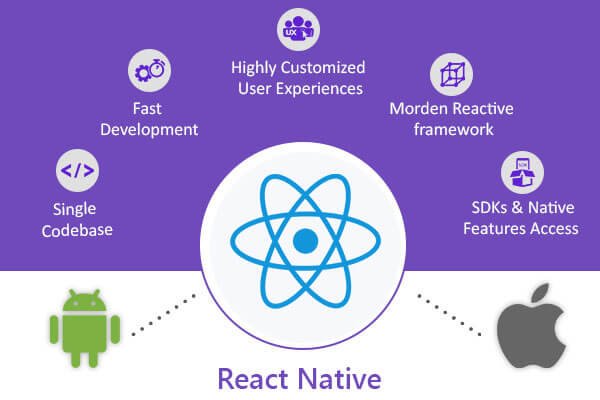
React Native Hybrid Mobile Application Developer
React Native (homepage) is a JavaScript framework for developing mobile applications that can run natively on both Android and iOS. It is based on ReactJS, developed at Facebook, which is a declarative, component-based framework for developing web user interfaces (UIs).
Both tools are highly popular: at the time of this writing, ReactJS and React Native were the 4th and 21st most-starred repositories on GitHub.
If you are already familiar with ReactJS you should easily pick up React Native as the same libraries can be used across both platforms.

Why Choose React Native for Mobile App Development?
Below top reasons listed for choosing React Native.
- Works under tight budget constraints
When you are starting your business, money is the most significant factor you are concerned about. Every start-up wants to achieve fast returns to survive in the tech-savvy market. One has to develop faster and stay longer. The big reason to hire React Native developer is you will save time and money when choosing React Native for mobile app development.
2. Offers cross-platform mobile app development
It allows you to use the same code for developing both Android and IOS applications. Thus, it gives the same performance outcome without any additional changes. Within no time you can design a mobile application for your kind of business. The need for different languages like JAVA, Swift, C++ or any other is no longer required. All you need is a JavaScript developer that is profound with native UI library, APIs, and hybrid mobile app development.
3. Multiple outcomes and suppleness under one undemanding solution
Based on ideas, react native mobile app development allows you to perform tasks that are complex using simple codes. This framework uses the UI library created by Facebook to make more straightforward codes for implementing and executing ReactJS. In the core of it, react native mobile app developer has ‘Live Reload’ feature. It allows us to operate on real-time code changes and make corrections while the app is loading.
4. The goal is affixed on UI and access to Native API
This way one can make UI look exactly like a JavaScript and less of a framework itself. It’s a pattern used to simplify the process and make UI work in a smooth manner to give high end quick responsive outcomes. Build a mobile app for your business without any complexity.
5. The Primary code base for Android and IOS makes things straightforward
The foundation level programming uses the same code for both OS. It’s like deploying the same app to all types of the mobile operating system. Recompiling the app becomes easy without any changes in the framework at any level you want. The entire module is written in a comparable language to link it with react native mobile app developer.
6. The journey from transforming a web page to the mobile app is super easy
With fragmented module and intuitive code overlays react native is interfaced clearly and properly. That means any developer can understand the sequence of codes that run by the application. There’s no need to have a core developer team to keep accessing the app. In times of changing staff and seeking outer boundaries, one can easily adapt to the development and the situation does not stop the development of the app.
7. Runs like a native app
The basic building blocks of such an app are compiled to their roots that are native platforms. WebView system components can be completely overlooked while using hybrid mobile app development.
All the codes are comparable with React, for both IOS and Android. With a handful of institutions, it functions relatively more efficient and reacts faster to all conjunctions. The fundamental units of React Native are open to serve all demands for mobile gadgets. Thus, it performs lucratively under mobile environment.
Generally, native processors are central processing units but react native choose to go with graphics processing unit to make its user interface lay easily mounted. Compared to other cross-platform mobile app development and android frameworks, it allows us to create and execute faster and increase the agility of the app.
8. Comparatively less usage of memory
It is compatible with 3rd party plugins and React Native tools provides smoother run-time. The lucrative framework, with its well-diversified modules, the 3rd party involvement is made much easy. Without using WebView one can easily connect the module to the plugin via native module. This phase is directly linked with app outcome features that allow it gives a faster response. The React native for iOS and Android platforms use much less of the memory space, as the cross-bridge linking is not required and most of the codes are used during run-time.
9. It’s not going to eradicate anytime soon
React native mobile app developer is in for more and more decades to come. The user-friendly manual and timely assorted framework are hard to resist by any developer. It’s almost covered the market of app development within no time. Facebook is making sure that it stays longer. By each passing day, the framework is developed more and more giving us solutions to all our problems. No need to learn about different languages and create complex codes anymore where you can create simply anything using React native.
10. Futuristic and flexible approach towards projects
With developing a framework that has interfaced with both iOS and Android, a single code is enough to remove bugs and develop it more and more every day. Though the operations are simple, this one is in the market for a long time. All major heads are using this module, so it’s obvious to be more reliable and responsive.
React native app development provides you a platform where you can keep tabs on memory spacing and make the application more efficient. Developing on both iOS and platforms under the same codes is like the cherry on top. The main question for any entrepreneur is to get a hold on the application developer. If the person drops out of the project, by any means, your heart and soul of the project is lost.
Many projects are left incomplete due to sole reasons for developer backing off from the project. Now, no worries! React native comes with a manual that is understood to all. The developer may drop off, but it won’t stop you from making your application under your timeline. It’s an all-in-one solution for time and money. Switch to React Native and experience a lifetime service of easy developing and smart responsive techniques.
Requirement for React Native Hybrid Mobile Application Developer
Job Description
We are looking for a React Native developer interested in building performant mobile apps on both the iOS and Android platforms. You will be responsible for architecting and building these applications, as well as coordinating with the teams responsible for other layers of the product infrastructure. Building a product is a highly collaborative effort, and as such, a strong team player with a commitment to perfection is required.
Responsibilities
- Build pixel-perfect, buttery smooth UIs across both mobile platforms.
- Leverage native APIs for deep integrations with both platforms.
- Diagnose and fix bugs and performance bottlenecks for performance that feels native.
- Reach out to the open source community to encourage and help implement mission-critical software fixes—React Native moves fast and often breaks things.
- Maintain code and write automated tests to ensure the product is of the highest quality.
- Transition existing React web apps to React Native.
- {{Add any other relevant responsibilities here}}
Skills
- Firm grasp of the JavaScript {{and TypeScript or ClojureScript}} language and its nuances, including ES6+ syntax
- Knowledge of {{functional or object-oriented}} programming
- Ability to write well-documented, clean Javascript code
- Rock solid at working with third-party dependencies and debugging dependency conflicts
- Familiarity with native build tools, like XCode, Gradle {{Android Studio, IntelliJ}}
- Understanding of REST APIs, the document request model, and offline storage
- Experience with automated testing suites, like {{Jest or Mocha}}
- {{Make sure to mention any other frameworks, libraries, or other technologies relevant to your project}}
- {{List any education level or certification you may require}}
